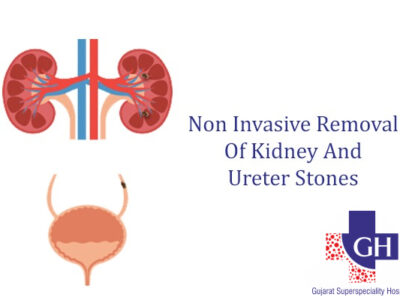With newer technologies being introduced doctors are using them for minimally invasive treatments. These procedures are done by doing tiny cuts (incisions) or tube style instruments are used that are inserted into the urethra for treating urinary disorders. Other benefits of minimally invasive surgeries are:
- Faster recovery
- Less pain than traditional or open surgery
- Fewer risks
Our doctor will consider your overall health and determine if minimally invasive surgery is right for you at Gujarat Superspeciality Hospital.
Minimally invasive treatment for Prostate problem
Benign Prostatic Hyperplasia is an enlarged prostate. The prostate goes through two main growth cycles during a man’s life. The first occurs early in puberty when the prostate doubles in size. The second phase of growth starts around age 25 and goes on for the rest of the patient’s life. BPH most often occurs during this second growth phase.
As the prostate enlarges, it presses against the urethra and the bladder wall becomes thicker. The bladder may weaken eventually and lose the ability to empty fully, leaving some urine in the bladder. Narrowing of the urethra and urinary retention and problems like being unable to empty the bladder fully can cause BPH.
Types of minimally invasive surgeries for Benign Prostatic Hyperplasia –
- Transurethral microwave therapy – This procedure uses a microwave antenna attached to a flexible tube that the doctor inserts into your bladder. The microwave heat kills off excess prostate tissue.
- UroLift system – The UroLift is a permanently placed device. It is used to lift and hold the enlarged prostate tissue out of the way to stop it from blocking the urethra. The procedure does not affect sexual function. It is typically performed using local or general anesthesia.
- Rezum Water Vapor therapy – A device is inserted into the urethra and a small needle delivers water vapor or steam to treat the excess prostate tissue.
Minimally invasive treatment for kidney stones
- Shock Wave Lithotripsy – Shock Wave Lithotripsy is the most common kidney stone treatment and works best for those having small or medium stones. It is non-invasive surgery, meaning that no cuts are made in the skin of the body and high-energy shock waves are used to break the stones inside the kidney.
Shock waves from outside the body are targeted at the kidney stone which leads the stones to fragment into small pieces. Another treatment has to be performed if large pieces are remaining after the procedure. Stones that are smaller than 2 cm in diameter can be treated by SWL. The treatment might not be effective enough for those having larger stones.
- Ureteroscopy – This procedure treats stones in the kidneys and ureters in which the doctor uses a thin, flexible scope to find and remove stones. No cuts are made in the patient’s skin. While using this procedure, the ureteroscope which is 4.5 Fr in size is used. With the help of anaesthesia, the ureteroscope is passed into the urethra, in the bladder, to the ureter and then straight to the stones. Smaller and bigger stones are fragmented by using holmium laser devices.
- Percutaneous Nephrolithotomy or Percutaneous Nephrolithotripsy – This procedure is used for patients having large or irregular shaped kidney stones or people with infections or stones that have not been broken up enough by SWL or those who have not been treated by the above two treatment modalities. This surgical procedure is used for treating stones that are bigger than 2 cm.
The procedure involves entering the kidney through a small incision in the back. Once the surgeon reaches the kidney, a nephroscope (a miniature fiber optic camera) and other small instruments are threaded in through the hole of the body. If the stone is removed through the tube, it is called nephrolithotomy, however, if the stone is broken up and then removed, it is called nephrolithotripsy. High-frequency sound waves are used to break up the stone, and then vacuum up the dust using a suction machine.
Gujarat Superspeciality Hospital provides the best non-invasive/minimally invasive treatments for stones, prostate and urinary disorders. Visit the website to book an appointment today!

